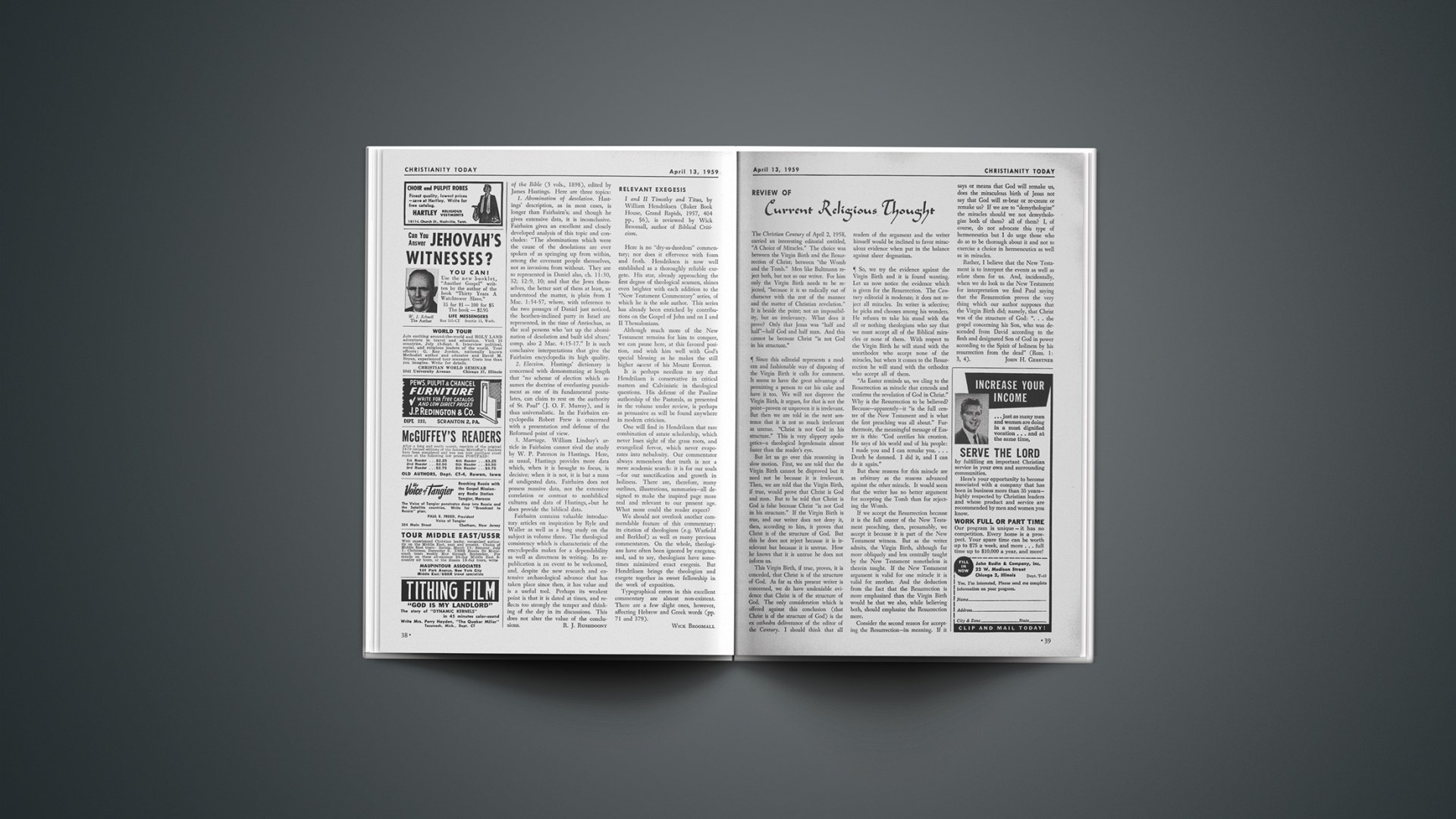The Christian Century of April 2, 1958, carried an interesting editorial entitled, “A Choice of Miracles.” The choice was between the Virgin Birth and the Resurrection of Christ; between “the Womb and the Tomb.” Men like Bultmann reject both, but not so our writer. For him only the Virgin Birth needs to be rejected, “because it is so radically out of character with the rest of the manner and the matter of Christian revelation.” It is beside the point; not an impossibility, but an irrelevancy. What does it prove? Only that Jesus was “half and half”—half God and half man. And this cannot be because Christ “is not God in his structure.”
Since this editorial represents a modern and fashionable way of disposing of the Virgin Birth it calls for comment. It seems to have the great advantage of permitting a person to eat his cake and have it too. We will not disprove the Virgin Birth, it argues, for that is not the point—proven or unproven it is irrelevant. But then we are told in the next sentence that it is not so much irrelevant as untrue. “Christ is not God in his structure.” This is very slippery apologetics—a theological legerdemain almost faster than the reader’s eye.
But let us go over this reasoning in slow motion. First, we are told that the Virgin Birth cannot be disproved but it need not be because it is irrelevant. Then, we are told that the Virgin Birth, if true, would prove that Christ is God and man. But to be told that Christ is God is false because Christ “is not God in his structure.” If the Virgin Birth is true, and our writer does not deny it, then, according to him, it proves that Christ is of the structure of God. But this he does not reject because it is irrelevant but because it is untrue. How he knows that it is untrue he does not inform us.
This Virgin Birth, if true, proves, it is conceded, that Christ is of the structure of God. As far as this present writer is concerned, we do have undeniable evidence that Christ is of the structure of God. The only consideration which is offered against this conclusion (that Christ is of the structure of God) is the ex cathedra deliverance of the editor of the Century. I should think that all readers of the argument and the writer himself would be inclined to favor miraculous evidence when put in the balance against sheer dogmatism.
So, we try the evidence against the Virgin Birth and it is found wanting. Let us now notice the evidence which is given for the Resurrection. The Century editorial is moderate; it does not reject all miracles. Its writer is selective; he picks and chooses among his wonders. He refuses to take his stand with the all or nothing theologians who say that we must accept all of the Biblical miracles or none of them. With respect to the Virgin Birth he will stand with the unorthodox who accept none of the miracles, but when it comes to the Resurrection he will stand with the orthodox who accept all of them.
“As Easter reminds us, we cling to the Resurrection as miracle that extends and confirms the revelation of God in Christ.” Why is the Resurrection to be believed? Because—apparently—it “is the full center of the New Testament and is what the first preaching was all about.” Furthermore, the meaningful message of Easter is this: “God certifies his creation. He says of his world and of his people: I made you and I can remake you.… Death be damned. I did it, and I can do it again.”
But these reasons for this miracle are as arbitrary as the reasons advanced against the other miracle. It would seem that the writer has no better argument for accepting the Tomb than for rejecting the Womb.
If we accept the Resurrection because it is the full center of the New Testament preaching, then, presumably, we accept it because it is part of the New Testament witness. But as the writer admits, the Virgin Birth, although far more obliquely and less centrally taught by the New Testament nonetheless is therein taught. If the New Testament argument is valid for one miracle it is valid for another. And the deduction from the fact that the Resurrection is more emphasized than the Virgin Birth would be that we also, while believing both, should emphasize the Resurrection more.
Consider the second reason for accepting the Resurrection—its meaning. If it says or means that God will remake us, does the miraculous birth of Jesus not say that God will re-bear or re-create or remake us? If we are to “demythologize” the miracles should we not demythologize both of them? all of them? I, of course, do not advocate this type of hermeneutics but I do urge those who do so to be thorough about it and not to exercise a choice in hermeneutics as well as in miracles.
Rather, I believe that the New Testament is to interpret the events as well as relate them for us. And, incidentally, when we do look to the New Testament for interpretation we find Paul saying that the Resurrection proves the very thing which our author supposes that the Virgin Birth did; namely, that Christ was of the structure of God: “… the gospel concerning his Son, who was descended from David according to the flesh and designated Son of God in power according to the Spirit of holiness by his resurrection from the dead” (Rom. 1:3, 4).










